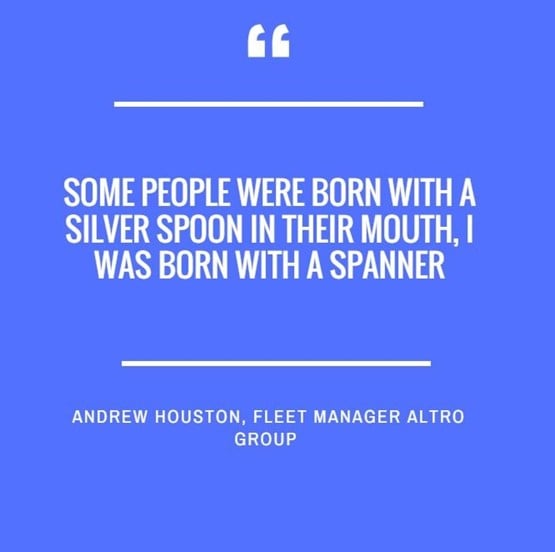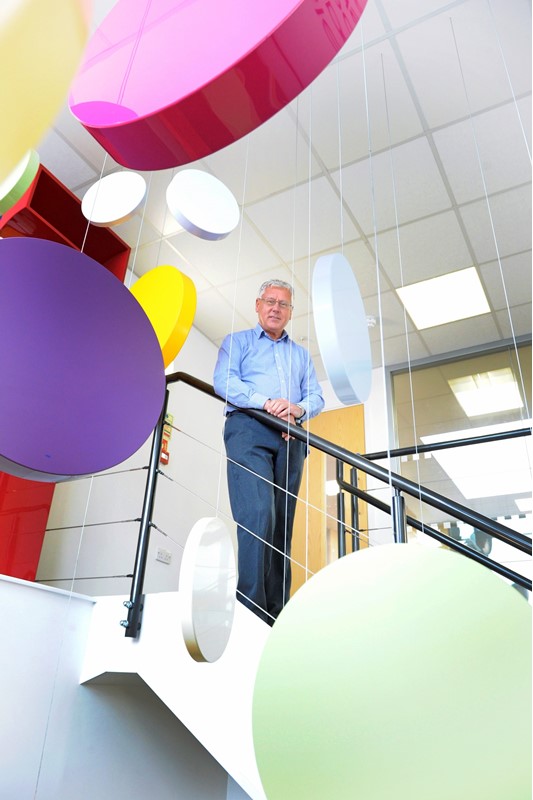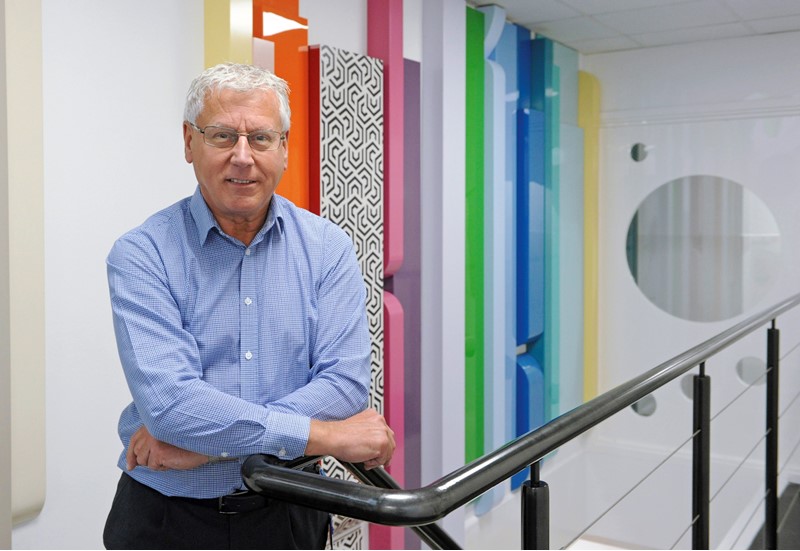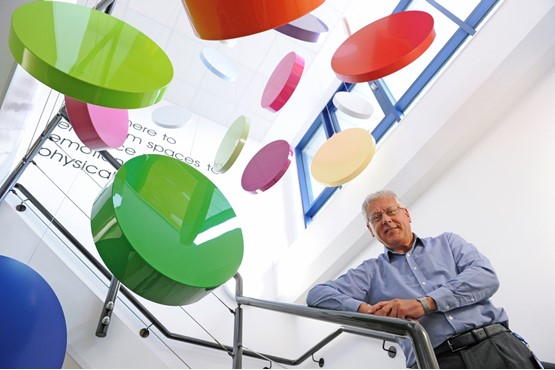"I broke my crystal ball last week," says Altro Group's Andrew Houston, as predicting the future for the Group's fleet is not easy. However, safety is paramount for the present.
At the core of the Altro Group business – responsible for inventing safety-enhancing flooring - is a mantra that none of its employees or customers should ever be harmed.
Despite having a modest fleet of 136 vehicles, the business rightfully extends its “zero-harm” philosophy from the factory floor to the road.
Responsibility for the company’s fleet falls on Andrew Houston and he says there is nothing else he’d rather be doing.
Having spent 20 years working in supply chain, warehousing and distribution, the second chapter in Houston’s career was in IT.
It was during this time – some 16 years ago – that Houston got his first taste for fleet.
He took over the IT department and later encompassed procurement, which, at the time, included cars.
Six years later the business recognised the need for a fleet manager role and assigned it to Houston, alongside his existing IT responsibilities.

“I was happy to take fleet on,” he recalls. As a self-confessed petrol head, Houston says his interest in cars was one of the key aspects that attracted him to the role.
“Some people were born with a silver spoon in their mouth, I was born with a spanner,” he adds.
Houston’s background in IT and supply chain gave him the skills to implement policy and drive efficiency. He likens fleet management to implementing GDPR; it’s about having the right processes in place and the necessary proof.
“The most dangerous thing you do day-to-day is drive, but you don’t think about it as dangerous at all.
“No matter the size of the fleet, exactly the same rules apply,” he says. “Just ignoring something isn’t good enough – you have to be upfront, ask questions and put processes in place.
“Have you got everything in place and are you actually doing what you are saying you are doing? Where’s the proof? We’ve tried to approach things in that way.
“Whatever it is that leads to safe driving in a safe vehicle – that is the number one priority.”
Altro Group is almost 100 years old. It is made up of two distinct businesses. Altro – short for aluminium trioxide, a key ingredient in making flooring grip better – manufactures a range of floor and wall coverings, from its factory in Letchworth.
The other business, based at the same location, is the Auto Glym car valeting brand.
When Houston took over the group’s fleet, there were a number of challenges that he set about rectifying.
Cars were bought outright. He promptly switched to contract hire with maintenance packages to manage choice and costs and set about re-writing the policy to have tighter controls.
Having initially opted for a sole-supply arrangement, within two years Houston realised he could get more competitive rates for the same cars by working with multiple companies. Now he uses a broker to find the best deals.
The number of bands has shrunk from 15 to just five, for sub-director level employees.

“Our user choice list has a range of cars in every single band that allows somebody with a big family to have a MPV or SUV, for example, and someone who is a singleton to have a little BMW 1 Series. There is a whole choice of vehicles to fit different roles.”
Starting with a list of every car that has a Cap HPI code, Houston writes the choice list.
“I look list-on-list to see if we are we going in the right direction. Are we keeping the same sort of cars? Are we reducing the choice? We want the list to be comparable or getting better year-on-year and we’ve managed it every year so far,” he says.
The culture at the family-run business means Houston knows all his drivers individually.
“We try to get it right, the key thing for us is safety – that is absolutely key. The second thing is keeping people mobile. If they aren’t mobile they can’t do their job,” he says.
Houston does everything from contacting drivers when their car is due for renewal to quoting, procuring, supplying and then managing the vehicle in-life.
Support partners are used to carry out licence checking, accident management and risk assessments.
“Everything else is done internally. We feel we are small enough and it’s cost-effective,” says Houston.
“Should we be outsourcing more? I often ask myself the question whether the role of the fleet manager is dead.
“But, if you outsource something you have to control it. You have to set the parameters and the contractor will apply those parameters. If it falls outside of those they will ask you what to do. It still needs someone inside to instruct and manage the contractor.
“There is always a view to how could we do something better or different and I play a part in that. I often ask the question. We have outsourced three things already and over time we might push a bit more out if it’s sensible.”
He adds: “Altro Group has 127 cars, eight vans and one HGV. Around 25% of the car fleet is used by Auto Glym, plus all the vans. The HGV is used to move goods from the factory to a distribution centre a mile up the road.”
There are a further 70 vans written to Auto Glym’s specification. They belong to franchisees who are entitled to operate as ‘Auto Glym’. Houston doesn’t control these vehicles but their franchise contract includes clauses stating that the vans must be kept clean and presentable and sign written in a specific way.
“Some of the cars and people I don’t see from year to year as they are based regionally,” explains Houston.
Around 80% of the fleet is job need and can cover up to 30,000 miles per year in the hands of salespeople.
To maximise fleet visibility, Houston asks each driver to complete a short form that includes end of month mileage and a checkbox list based on the FORS (Fleet Operator Recognition Scheme) standard.
“Every month they have to confirm the tyres and fluid levels are OK and the service is up to date – it’s all the key things about checking your car,” he says.
Maintenance and tyres are looked after by the contract hire company, so Houston only comes into contact with the driver if they have an incident or are due a replacement.
“I did a survey of the last 20 people that had any contact with fleet, asking about all the aspects of fleet and it came back pretty glowing. The feedback is that it’s working. I know it’s cost-effective because I’ve done the modelling.”

Despite having a small turnover of cars Houston has managed to develop strong manufacturer support.
“I deal with them all personally and they are excellent at supporting us with demos and terms – which is very useful,” he says.
“We value those relationships – virtually every manufacturer on our list we have support from. That’s a key part of what makes it work.”
The fleet achieved FORS Bronze standard three years ago and every driver has to undergo a Cardinus risk assessment.
“If they get a low score they go through more intensive online training. After that, we would put them on the road,” Houston says.
Accidents are taken seriously and if, following an incident, it is deemed necessary by the group health and safety advisor, specific training will be provided.
“We’ve not had many serious accidents over the years,” explained Houston, “but the driver would be interviewed by a professional interviewer and a report written up for the company.”
A CPG (car policy group) consisting of two group board directors, the HR director, the HR manager and Houston, meets quarterly to discuss accidents, incidents and issues.
Houston said if a particular driver is demonstrating a trend of poor driving, the group will intervene as necessary.
Total reported incidents have reduced by 30% in the past five years and in cases where the driver was present (50% of total), only 37% were found to be at fault.
To reduce the risk of minor knocks and scrapes, Houston specifies all cars with parking sensors.
However, when asked what his fleet will look like in two or three years Houston replies: “I broke my crystal ball last week.”
He believes everyone in the industry is in a state of disarray as a result of the lack of clarity of future benefit-in-kind taxation and confusion over new WLTP (Worldwide harmonised Light vehicle Test Procedure) emissions figures.
“Essentially, I’m holding the list – at the moment we are saying we’ll meet the equivalent car that we had last September, until we can cut a new list when all this stuff washes through and we have some visibility.”
While the fleet includes some hybrid vehicles, Houston says most of them are too expensive to fall into the bandings and it’s not something the business has ever pushed employees towards. He says: “Moving forward we are looking at how we can construct the list in a different way. When we have WLTP info, should we construct lists by something other than cars we want, lease value and CO2?

“Should we make it freer to people? There are lots of models out there, should we give them a criteria and let them do as they like?
“There may be a possibility to incentivise truly green cars. As a company we have won green awards. Should we be driving the fleet? It’s 6% of our energy usage.”
Houston has been using a guideline CO2 cap of 130g/km, but has allowed models above this to give greater choice. “A cap of 99g/km is no good for families,” he said.
Still, the company’s average fleet emissions are less than 120g/km, including vans. Houston believes this is down to drivers making a conscious decision to decrease their tax outlay.
“Some 85% of the drivers 10 years ago were looking for the bigger engine cars. Now, the same percentage of people get the list and sort it by CO2 first then filter out the cars they don’t like,” Houston said.
Five years ago he introduced a cash allowance, expecting a small percentage of perk drivers to take the option.
Already, 21 people have ditched their company car in favour of the money, including some job-need drivers. Houston believes more may take this decision when their next car is due as a result of increasing costs.
“The reality is they are looking to buy a used diesel car because the tax on a new one is so high now,” he says.
“Combined with the tax changes last year, drivers who choose a small economical car don’t get the tax advantage anymore. The system is not driving the behaviour that the Government says it wants to achieve.”
Drivers who do take a cash allowance still have to meet strict criteria set by Houston.
“Do we say here is some money, off you go? No we don’t.
“We authorise the car, we check the insurance, the servicing, everything about them. All the duty of care you expect for a contract hire car is applied exactly the same to the allowance car,” he explains.
Cash allowance drivers are also only entitled to claim the advisory fuel rate rather than tha AMAP rate when travelling for business; the same as contract hire drivers.
Whatever the next few years bring, Houston is content on seeing it through. He recently retired from his IT responsibilities for personal reasons and looks after the fleet on a part-time basis.
“I’ve never avoided a challenge and I’d like to see this through,” he says. “I am excited by fleet and I’d like to influence it if I can.”


















Login to comment
Comments
No comments have been made yet.